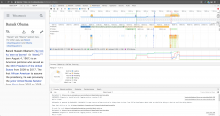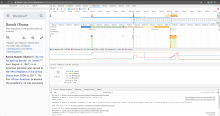In the mobile site, the references widget parses the HTML of the page to generate a structured data object representing all references in the page.
When a reference is clicked it shows a "ReferencesDrawer" widget showing the user the reference in place.
Given the references HTML accounts for 50% of the total page HTML on many of our pages and very few people view references on mobile and the fact that this would save our users many terabytes of data in a year, we should not serve this by default and instead route requests for references to a special page and use the API when JavaScript is enabled to retrieve references when needed.
Further reading:
Problems with existing implementation
- Rendering can be very slow
- If you visit https://en.m.wikipedia.org/wiki/Special:MobileCite/790359434 we lazy load the Notes section however this is no lazy loading of the references or further reading section. It is not clear if this is a bug or expected behaviour.

